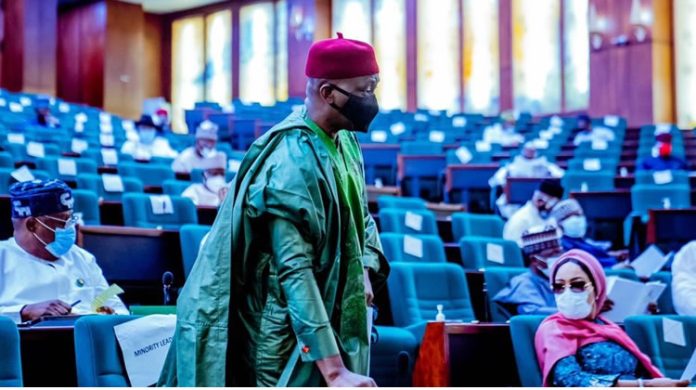Members of the House of Representatives who have been re-elected for the 10th National Assembly are divided over which geopolitical zones should produce the next leadership of the federal parliament.
Several members of the House, who spoke to our correspondent in different interviews, explained why their zone should field occupiers of certain positions, including the number of votes garnered by the All Progressives Congress in the recently concluded 2023 general elections.
The current 9th National Assembly was inaugurated in June 2019 and the 10th is expected to be inaugurated the same month in 2023.
At the House, none of the lawmakers has officially declared their interest for the speakership seat.
However, some of them have been reported to be in the race.
They include the Deputy Speaker, Ahmed Wase; embattled Majority Leader, Alhassan Ado-Doguwa; Chairman of the House Committee on Navy, Yusuf Gagdi; Chairman, House Committee on Appropriations, Aliyu Betara; and Chairman, House Committee on Science Research Institutes, Olaide Akinremi, as well as Kalu, among others.
On the other hand, at least two members of the Senate have openly declared their presidential ambitions. They are the Majority Whip, Senator Orji Uzor Kalu; and Chairman, Senate Committee on Appropriations, Jibrin Barau.
Several of the lawmakers said to be nursing the ambition of becoming the Speaker of the House of Representatives, who were contacted by our correspondent but declined to speak on their ambitions, noted that the zoning plan of their party, the APC, would determine which leadership positions to contest.
The national leadership of the party had met with the National Assembly members-elect in Abuja penultimate Monday.
While it was expected that the ruling party would guide the lawmakers on the zones to hold specific positions, the discussion was deferred till after the governorship and state House of Assembly membership election.
It was learnt that the speakership aspirants from the South-West might join the deputy speakership race, should the APC take the office of the speaker to another zone.
A speakership aspirant, Benjamin Kalu, in an interview with our correspondent, alleged that some of the aspirants were already dropping the name of the President-elect, Bola Tinubu, as backing their speakership bid.
While dismissing the alleged support as untrue, the House’ spokesman called for a level playing field in the race.
Kalu, who is Chairman of the House Committee on Media and Public Affairs, said, “It is part of democracy and democratisation of the government. The party’s leadership will take its decision based on the need to balance power and create national cohesion.
“A lot of things will be put into consideration before that decision is taken. All those who are rushing and claiming that the President-elect has nominated them, or that he is looking at them, are doing that on their own. The President-elect cannot do it.
“Moreover, the party is faced with the governorship election, after which they will now look at the issue of the National Assembly leadership.”
One of those believed to be kingmakers in the House, who spoke to our correspondent on the condition of anonymity, said the APC was considering the South-East and the South-South for Senate presidency, with the current Chief Whip, Senator Orji Uzor Kalu (Abia), and former Minority Leader, Senator Godwill Akpabio (Akwa Ibom) leading the contenders from these zones, respectively.
It is the tradition of the National Assembly that ranking members – those who have served two or more terms – be made presiding and principal officers.
The presiding officers are the President of the Senate, Speaker of the House, Deputy President of the Senate and Deputy Speaker of the House. They are to be adopted or elected by members of the chambers respectively.
The principal officers are leaders of the majority and minority caucuses, who, together with the presiding officers, form the leadership of the chambers.
They are the Majority Leader, Deputy Majority Leader, Majority or Chief Whip, Deputy Whip, Minority Leader, Deputy Minority Leader, Minority Whip and Deputy Minority Whip.
While the President-elect, Bola Tinubu, is from the South-West, the Vice President-elect is from the North-East. Both of them are Muslims.
The APC is expected to be considering the remaining four zones – North-Central, North-West, South-South and South-East – for other leadership positions in the National Assembly.
The party is also expected to consider religious balance in the executive and legislative arms of the government.
Chances and odds
Wase and Gagdi are both from Plateau State, but while Wase is higher in ‘ranking’ than Gagdi, the latter is said to have called for youthful leadership of the House.
While Gagdi will be contesting against Wase for the speakership seat, those campaigning for them have urged the APC to zone the office to the North-Central, a zone that has yet to produce speaker of the House.
Though the incumbent Speaker, Femi Gbajabiamila, is from Lagos State in the South-West, same state and geopolitical zone with the President-elect, Bola Tinubu, the Vice President-elect, Kashim Shettima, is from Borno State in the North-East, same with Betara.
Akinremi is from Oyo State, same zone with the incumbent Gbajabiamila.
Ado-Doguwa, who is from Kano State and arguably the most influential state in the North-West, has had his re-election cancelled by the Independent National Electoral Commission and is facing criminal charges.
Kalu, the House spokesman, is coming for a second term from Abia State in the South-East where opposition like the Labour Party and All Progressives Grand Alliance depleted APC votes.
Meanwhile, the incumbent Speaker, Femi Gbajabiamila, had on March 14, 2023, said he would remain on the floor of the House to continue to add value to the law-making process after leaving the leadership seat.
Gbajabiamila made this known while speaking to members of the House of Reps Press Corps on Tuesday evening.
Share your story or advertise with us: Whatsapp: +2347068606071 Email: info@newspotng.com















